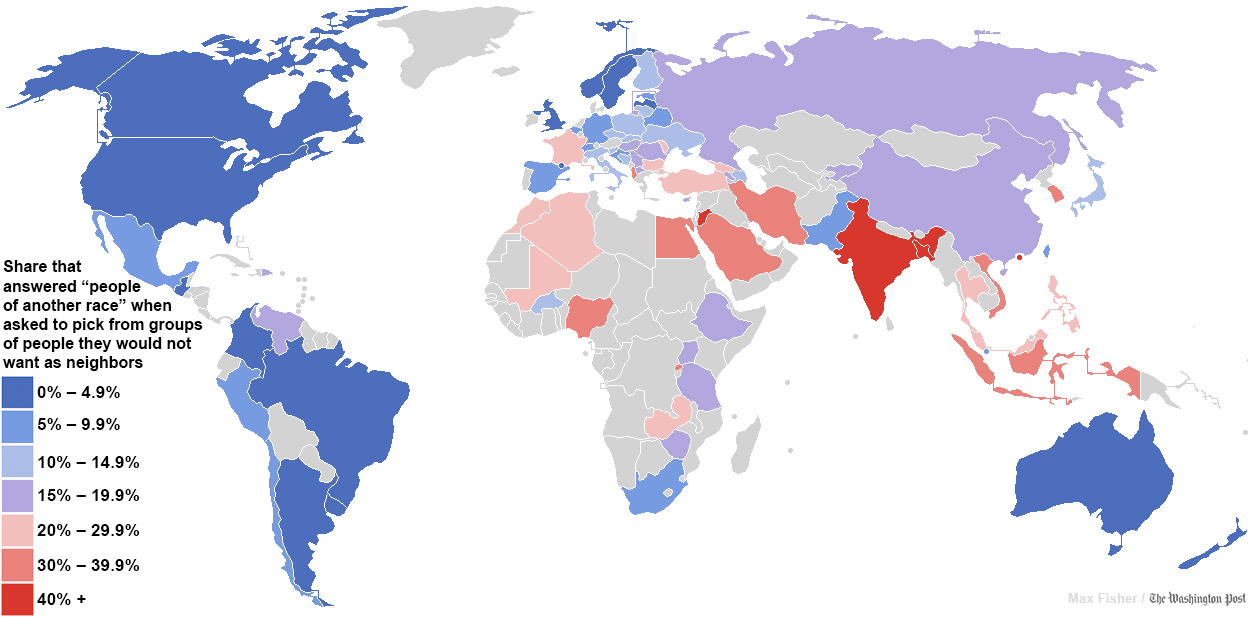If you're a geography nerd, whatever you do, don't try playing Geoguessr. It will take hours of your life away.
The idea: it puts you down at a random spot on Google Street View, and you have to figure out where you are. Here's one of my attempts, before I realized I needed to do some work today.
I blame Randall Munroe.
A little grisly accident via The Atlantic:
Now you know the last thing a whole bunch of salmon ever saw.
I have 21 hours of budget to finish a substantial project at work, and then another project to finish by the end of May. Posting may be iffy the next couple of days.
Coming up, the final figures on how much moving to Azure saved me.
It's 26°C and sunny in Chicago right now, so I'm going for yet another walk. Regular posting to resume later today or tomorrow.
The BBC has a list of 10 euphamisms that bring back memories of political scandals past:
2. "Discussing Uganda" In 1973, the satirical magazine Private Eye reported that journalist Mary Kenny had been disturbed in the arms of a former cabinet minister of President Obote of Uganda during a party. Variations of "Ugandan discussions" or "discussing Uganda" - the term is believed to have been coined by the poet James Fenton - were subsequently used by the Eye to describe any illicit encounter, and the phrase soon became part of common usage.
I am still trying to work out how badgers fit into it...
It's sobering that babies born the day I graduated college can take their first legal drinks today.
Via Sullivan, American Public Media's Kai Ryssdal yesterday committed an act of journalism against the former defense secretary:
I don’t know if y’all had a chance to listen to Donald Rumsfeld being torn a new one on Marketplace yesterday, but it was glorious to hear. Rummy was no doubt expecting softball questions about his new book Rumsfeld’s Rules and instead was grilled about how the wisdom in his book is in stark contrast to his work with Iraq and Afghanistan. I’ve never felt a man squirm through airwaves like that.
I had to rewind a couple of times during the interview. As Sullivan said, "this guy is dangerously out of touch with reality, even as he insists he alone grasps reality."
Via Sullivan, Max Fischer at WaPo found an interesting proxy for racial tolerance:
Among the dozens of questions that World Values asks, the Swedish economists found one that, they believe, could be a pretty good indicator of tolerance for other races. The survey asked respondents in more than 80 different countries to identify kinds of people they would not want as neighbors. Some respondents, picking from a list, chose “people of a different race.” The more frequently that people in a given country say they don’t want neighbors from other races, the economists reasoned, the less racially tolerant you could call that society.
Here’s what the data show:
Anglo and Latin countries most tolerant. People in the survey were most likely to embrace a racially diverse neighbor in the United Kingdom and its Anglo former colonies (the United States, Canada, Australia and New Zealand) and in Latin America. The only real exceptions were oil-rich Venezuela, where income inequality sometimes breaks along racial lines, and the Dominican Republic, perhaps because of its adjacency to troubled Haiti. Scandinavian countries also scored high.
Here's the map:

I'd love to see this data mapped at the U.S. county level...
Noam Scheiber shakes his head about the origins of the IRS-Tea Party scandal:
Fine—there’s no law against neurosis. But, to borrow a thought experiment from my colleague Alec MacGillis, consider all this from the perspective of the IRS’s Cincinnati office, which handles tax-exempt groups. You’re minding your own business in 2009 when you start to receive dozens of applications from right-leaning groups, applications you didn’t solicit and don’t require. You peruse a few of the applications and it looks like many of the groups, while claiming to be “social welfare” organizations, have an overtly political purpose, like backing candidates with specific ideological agendas. Suffice it to say, you don’t need an inquisitorial mind to decide the applications deserve careful vetting. One Tea Party activist from Waco, Texas, has complained that an IRS official told her he was “sitting on a stack of tea party applications and they were awaiting word from higher-ups as to how to process them.” The quote is intended to sound nefarious—an outtake from some vast left-wing conspiracy—but it’s actually perfectly straight-forward: The IRS was unexpectedly flooded by dodgy 501c4 applications and was at a loss over how to manage them.
So the crime here had nothing to do with “targeting” conservatives. The targeting was effectively done by the conservative groups themselves, when they filed their gratuitous applications. The crime, such as it is, was twofold. First, in the course of legitimately vetting questionable applications, the IRS appears to have been more intrusive than justified, asking for information about donors whose privacy it should have respected. This is unfortunate and intolerable, but not quite a threat to democracy.
Second, the IRS was tone deaf to how its scrutiny would look to the people being scrutinized, given that they all subscribed to the same worldview, and that they were already nursing a healthy persecution complex.
Meanwhile, the Tin Foil Hat crowd now has something that appears, at first glance, to be real government overreach for ideological reasons, and now the IRS will be even less likely to go after Astroturf groups.
This is what most people in the world call an "own goal."
Via Kottke, a few fascinating minutes color footage of London shot in 1927:
Want more 1920s UK footage? Voilà.